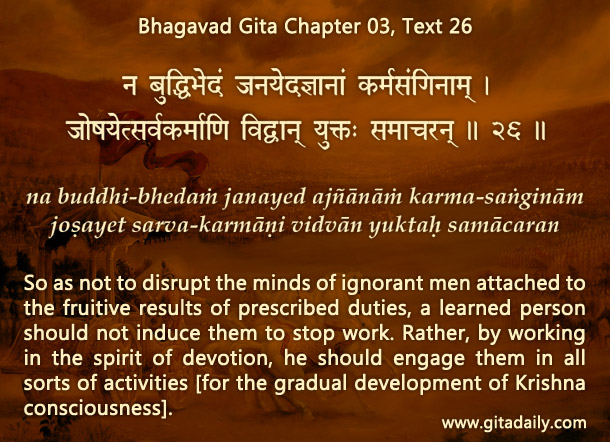When we strive to become God conscious by doing various devotional practices, we often start evaluating the God consciousness of those around us. We strive to persuade or push them to engage in devotional activities and feel disheartened if they don’t comply.
If we want to be more successful in sharing our God consciousness, we often need to expand our own conception of God consciousness. That means appreciating the reality that independent of how anyone is acting in relationship with God, God is still acting in their lives. He is present in everyone’s heart as the Supersoul, guiding their wanderings through material existence (Bhagavad-gita 18.61). He is everyone’s greatest well-wisher (05.29).
When we strive to discern how God is acting in their world and in their heart, that attempt will increase our humility and decrease our judgmentality. How increase our humility? Because we will stop thinking simplistically that we will deliver others if they just do our bidding. How decrease our judgmentality? Because we will stop simplistically rating others’ spirituality based solely on whether they do the things we tell them. Pertinently, the Gita urges us to not impose one-size-fit-all instructions on others, but to engage them according to their level (03.26).
When we approach our relationships with a devotional learning attitude, we will be guided from within to aid them judiciously (10.10).
One-sentence summary:
To be God conscious in our relationships means not just being conscious of how others are acting in relationship with God; but also being conscious of how God is acting in their lives.
Think it over:
- How do we often see others’ God consciousness? Why is this vision limited?
- How can expanding our God consciousness change our attitude toward others?
- Think of one person close to you, focusing on their actions and life-events. Prayerfully discern how God is acting in their lives and how you can serve them.
***
03.26: So as not to disrupt the minds of ignorant men attached to the fruitive results of prescribed duties, a learned person should not induce them to stop work. Rather, by working in the spirit of devotion, he should engage them in all sorts of activities [for the gradual development of Krishna consciousness].


Leave A Comment